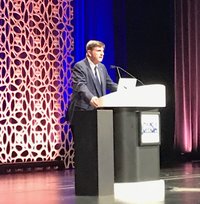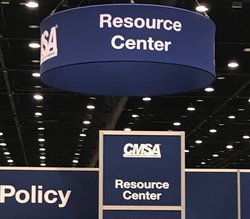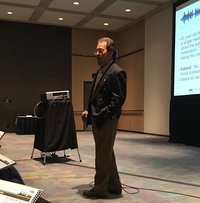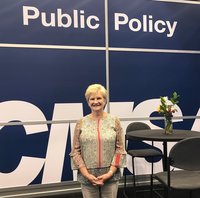
Good Morning, CMSA Attendees!
It’s the final day of the main conference, and we hope you’ve had the experience of a lifetime, reconnecting with old friends, meeting new ones, and gathering inspiration and ideas that you can take home with you and use in your practice of case management. And we’re not done yet!
Today begins with breakfast symposia at 7 a.m., followed by concurrent sessions at 8:40, including "Case Management Values that Prevailed During Hurricane Harvey." That’s followed at 10:20 a.m. by the opening of the Expo Hall, which will feature a brunch buffet and poster sessions. Lunch symposia will begin at 12:30, followed by more concurrent sessions at 2:10 p.m., including "Optimizing Case Management Services Through Telemedicine." And make sure to attend our closing keynote at 3:50 p.m., "Making an Impact," by Dr. Rick Rigsby.
|

Yesterday's Main Session
Following a video
introduction, Allan Hamilton, MD, FACS, took the stage to discuss the current,
troubled state of healthcare and what role case managers can play in improving
it.
He noted that while the
United States outspends every other nation on healthcare, its ranking in terms
of healthcare quality is much lower. A significant percentage of the population
is in either Medicare or Medicare, and out-of-pocket expenses among U.S.
healthcare consumers continue to increase.
Meanwhile, hospitals are
buying up private practices, fee-for-service payment can incentivize overutilization, and the ER is too often being used for primary care. The
average daily cost of a hospital stay was 6,000 percent higher in 2012 than it
was in 1958, and hospitals are operating on margins of only 2.5 percent.
So what can be done to
improve healthcare? According to Hamilton, what’s needed is a shift from
interventional to preventive care. Value-based payment, which provides
incentives to be more efficient, can be part of the solution.
He added that case managers are in
the driver’s seat when it comes to facilitating positive change. "There really
is no one else who could help drive the team and delivery of hospital and
post-discharge services," he said. He added, "CMs need to become identified as
an agent for change."
|

Presidents Panel: Legacy and Leadership
In yesterday’s Presidents Panel, a distinguished group of case management experts, all of them former presidents of CMSA, fielded questions and shared their extensive knowledge and experience with a large group of attendees in the Arie Crown Theater.
Kathleen Fraser, MSN, MHA, RN-BC, CCM, CRRN, introduced and moderated the panel. She recognized the past presidents who couldn’t attend, then introduced this year's panelists:
- Carrie Ann Engen-Marion, RN, BSN, CCM
- Nancy E. Skinner, RN, BC, CCM, ACM-RN
- Karen D. Chambers, RN, CCM, CDMS, CTC
- Ann Llewellyn, RN,C, BHSA, CCM, CRRN, CEAC
- Mary Beth Newman, MSN, RN-BC, CCP, CCM, CHCQM
- Mary McLaughlin-Davis, DNP, ACNS-BC, NEA-BC, CCM
- Jose Alejandro, PhD, RN-BC, CCM, FACHE, FAAN
- Jeanne Boling, former executive director
Kathleen Fraser posed questions to the panel that were submitted beforehand by attendees; then, she invited members of the audience to ask questions of their own.
Issues addressed by the panel included the following: implementing and upholding the case management standards of practice, addressing the burden of paperwork, how case managers can prove their worth and value, challenges facing case managers today, artificial intelligence in healthcare, issues related to state licensure, and diversity in case management.
In terms of proving the worth of case managers’ work, Anne Llewellyn said, "We have to celebrate our successes. Celebrate the good work that we do." And let your supervisor know, she added.
"What a difference you make for your patients," said Nancy Skinner. "Tell your stories. That’s how we prove our worth and value."
|
Expo Hall & Giveaway Schedules
Hours: 10:20 a.m. to 12:20 p.m.
Poster presentations from 10:20 a.m. to 12:20 p.m.
Brunch served from 10:20 a.m. to 11:50 a.m.
$500 cash giveaways sponsored by HCS Healthcare (Booth #325)
and Angel MedFlight (Booth #522)
|

CMSA Resource Center
Visit CMSA’s Resource Center in the Expo Hall (booth #429) to learn about CMSA’s tools and resources, meet a few of the CMSA National Board Members and local Chapter Leaders and stock up at the CMSA store!
|
Beyond the Acronym: Motivational Interviewing to Improve Adherence 
Motivational interviewing was developed to address patient resistance and ambivalence to changing unhealthy behaviors, said Bruce Berger, PhD, president of Berger Consulting, LLC, and emeritus professor at Auburn University. However, he stressed, it’s not about persuading or motivating people to change.
He added that educating patients is a necessary precursor to behavior change, but knowing isn’t enough, because it’s difficult to change behaviors.
MI does two important things, he said: It uses specific skills to explore the concerns and feelings of patients, and it provides insight on how to address those concerns in a non-threatening way.
Berger said that his is a "sense-making approach" because "People are sense makers—we make sense out of everything." He noted that when people resist or are ambivalent to change, their sense making either "results from information that is incomplete; or contains errors or inaccurate information."
Berger’s sense-making approach to MI includes the following seven steps:
- "Listen to how the patient is making sense
- Clarify (nail down) the sense making
- Reflect back your understanding
- Identify needed information
- Address the issue (with permission)
- Invite the patient to consider the new information and draw a new conclusion
- Summarize and discuss next steps"
Note: For information about comMIt: Comprehensive Motivational Interviewing Training for Health Care Professionals, Dr. Berger’s 8-hour online program centered around motivational interviewing, which is available to CMSA members at a discounted price, visit http://www.cmsa.org/mi-learning/.
|

Susan Plough, MSN, APRN, BC, CCM
A member of the public policy committee
Q. What have visitors to the Public Policy
section of the Resource Center booth (#429) been most interested in?
A. "A lot of people want to be involved in public policy,
but they don’t know how. The most frequently asked question they have is, ‘What
can I do to become involved?’ At the Public Policy booth, we have tip sheets
available that describe what can be done if you have 15 minutes, 30 minutes, an
hour or even more time. Ways to get involved range from looking up the contact
information of your U.S. Senators and U.S. Representative to serving on a board
that deals with healthcare issues. Even if you don’t have a great deal of time,
there are ways to be involved and make a difference."
|
Thanks for All the Great #CMSA2018 Tweets!
Using the hashtag #CMSA2018, share with attendees and the case management community at large what you’re learning about, who you’re meeting, and how much fun you’re having at the CMSA 28th Annual Conference & Expo!
We can’t wait to see your insights and the connections you’re making. Follow @CMSANational, and be sure to use the official hashtag, #CMSA2018.
|
|
| |
|
